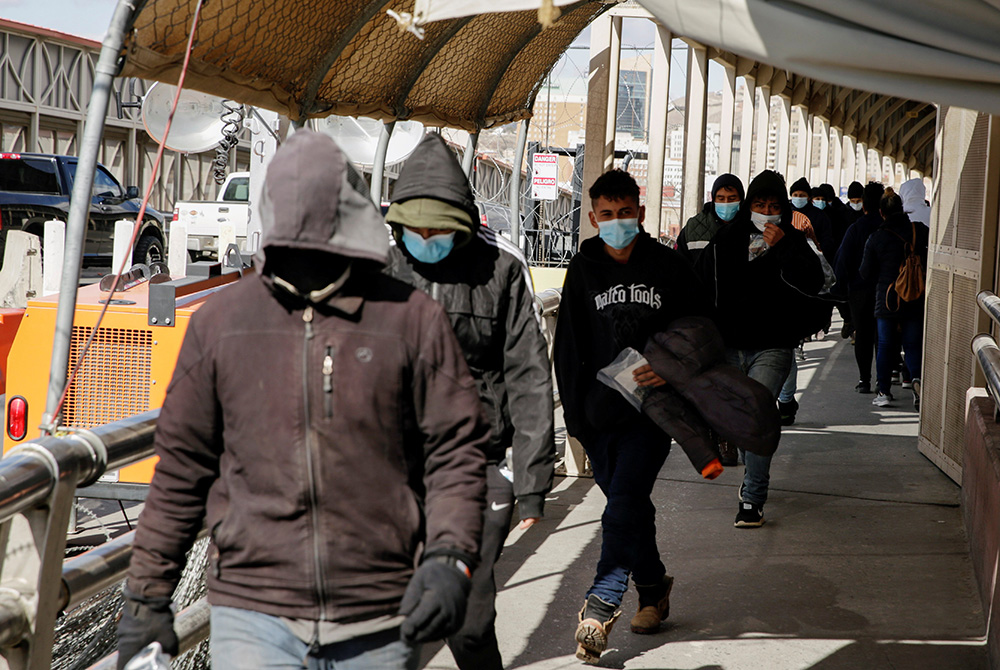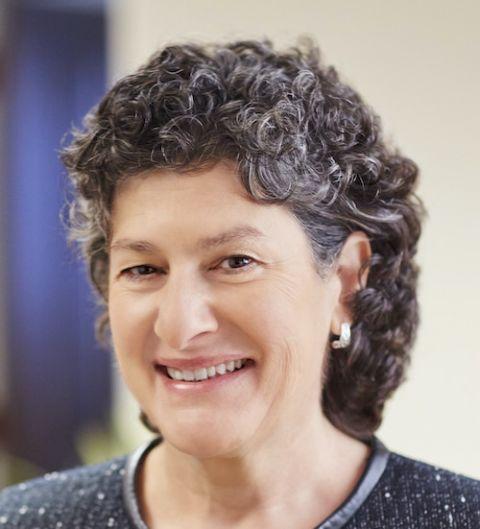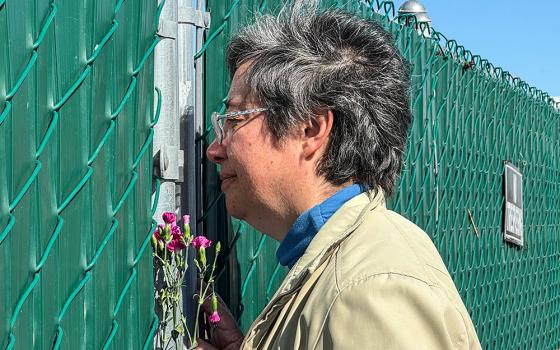
Novices of the Sisters of Life chat with young Given Forum participants over lunch as the 2019 forum concluded on June 16, 2019, on the campus of the Catholic University of America. (GSR file photo)
Editor's note: Global Sisters Report's Monday Starter is a weekly feature from GSR staff writers that rounds up news from or about women religious that you may otherwise have missed.

The 2021 Given Catholic Young Women's Leadership Forum is set for June 9-13 at the Catholic University of America.
The 2020 forum was canceled because of the coronavirus pandemic and replaced with an online event called "Discover the Gift."
The annual Given Forum is designed to develop young adult Catholic women leaders and help them find practical pathways use their gifts in service of the Gospel. This year, 130 women between the ages of 21 and 30 from 35 states, the District of Columbia, Canada, Mexico and the United Kingdom were accepted. It is put on by the Given Institute.
Given also welcomes 60 women religious from 20 congregations who represent a variety of apostolates and charisms in the church, and 30 laywomen will serve as dedicated mentors.
"The anticipation building up to the 2021 GIVEN Forum is palpable," Rachel Harkins Ullmann, Given Institute's executive director, said in a statement. "After two years of preparation, young emerging leaders and established women leaders will gather together, in-person, to discover the gift only they can give. ... In a world filled with great suffering, the gifts women bring are needed now more than ever."
United States officially ends 'Remain in Mexico' policy
On June 1, the U.S. government's "Remain in Mexico" policy officially came to an end, Reuters reports.
The policy, formally known as the Migrant Protection Protocols, was put in place by the Trump administration and forced those seeking asylum at the U.S.-Mexico border to wait in Mexico while their asylum claims were heard rather than waiting in the United States, as federal law allows.
The policy resulted in nearly 70,000 people waiting along the Mexico side of the border, many of them crammed into squalid camps or preyed upon by gangs of criminals. President Joe Biden's administration put the policy on hold Jan. 20, its first day in office, but the policy remained on the books until Homeland Security Secretary Alejandro Mayorkas killed it in a memo.
Since the policy was put on hold, more than 11,000 people have entered the United States while their asylum cases are processed, Reuters reported. Thousands more who were not part of the Migrant Protection Protocols have crossed the border, as well.

Migrants deported from the United States cross the Paso del Norte International Bridge in Ciudad Juarez, Mexico, on Jan. 25. On Jan. 20, U.S. President Joe Biden revoked a 2017 executive order authorizing massive expansion of immigration enforcement in the United States. (CNS/Reuters/Jose Luis Gonzalez)
The changes in policy have created massive shifts in demand for the agencies to serve asylum-seekers. Before the "Remain in Mexico" policy began, the humanitarian respite center run by Sr. Norma Pimentel — recently featured in a New Yorker story — sometimes received hundreds of people a day. Once the policy was in place, there were so few needing help that she traveled almost every day across the border to help the asylum-seekers waiting in Mexico. Now, the center and others like it along the U.S. side of the border are so swamped that sisters from across the country have traveled there to help out as volunteers.
One welcome change for many of those arriving is the government's move away from ankle monitors. Instead of the cumbersome, and sometimes painful, devices that must be recharged several times a day, U.S. Immigration and Customs Enforcement agents are using cellphones to track migrants.
An app called SmartLINK "uses facial recognition to confirm identity as well as location monitoring via GPS from a cellphone to ensure migrants are in the destination cities where they told border agents they would be traveling," said Border Report.
According to Syracuse University's Transactional Records Access Clearinghouse, about one-third of migrants released and monitored by ICE are using SmartLINK. Another third are on ankle monitors and another third must report in by telephone.
Advertisement
Brigidine Sister helps Australian teens fight coal company's expansion
Sisters fighting climate change have been winning impressive victories in recent years — we'll get to the latest in a moment — but they were hit with a loss recently in Australia.
Bloomberg reports Whitehaven Coal wanted to expand a New South Wales coal mine to produce up to 10 million tons of coal a year. Standing in its way was Sr. Brigid Arthur and a group of eight teenagers inspired by climate activist Greta Thunberg.
The group argued that allowing the expansion would unfairly impact the health and well-being of young people forced to live with the climate change that fossil fuels cause. Arthur, a Brigidine Sister, acted as the teens' litigation guardian because they were minors.
The judge in the case denied a request to stop the expansion, but the plaintiffs count the ultimate outcome a victory because the ruling says Australia's environment minister, the defendant in the case, must consider the impact of climate change on young people in future decisions.
"My future — and the future of all young people — depends on Australia stepping away from fossil fuel projects and joining the world in taking decisive climate action," plaintiff Ava Princi told Bloomberg.
The current Australian government is pro-coal, and Arthur has long been a critic of its short-sighted policies, especially on immigration.
"Our governments, for quite a long time now, seem to be swayed by short-term objectives, and in particular getting elected in the next election," Arthur told Thomson Reuters Foundation News in March. "They seem almost unable to do anything that is going to be a bit unpopular but in the long-term good for the country."

A coal-fired power plant is seen in this illustration photo. (CNS/Kacper Pempel, Reuters)
A bad day for Big Oil
Regardless of whether the Whitehaven Coal decision was a win or a loss, there's no doubt that the recent ExxonMobil board of directors' election was an enormous win for those fighting climate change.
Unlike other large petroleum companies, ExxonMobil has largely rebuffed any attempts at moving away from fossil fuels. It was a huge victory in 2017 when shareholders voted to require the company to analyze the risk that climate change, and regulations to slow it, posed to its business, something sisters involved in corporate activism had long been fighting for.
Enter a small activist hedge fund called Engine No. 1. The fund didn't just push the company to address climate change; it put four nominees up for election to Exxon's 12-member board of directors. And on May 26, two of them won, beating the company's nominees in a victory some are calling "the biggest upset since David and Goliath."
May 26 was a bad day for Big Oil: In addition to the ExxonMobil vote, Chevron shareholders backed significant cuts to the firm's greenhouse gas emissions, and a Netherlands court ordered Royal Dutch Shell to make massive cuts in its carbon emissions.
While it remains to be seen whether the result will have any immediate effect, the voices pushing back against climate change are now inside the boardroom and at the table. And Nell Minow, vice chair of ValueEdge Advisors, told NPR that if those voices are ignored, activist shareholders will be back again next year and will keep adding directors until they have a majority.
"I mean, just last week, President Biden issued a major executive order that is going to put a lot more pressure on fossil fuel companies," Minow told NPR. "If they don't adjust to that, they're going to go the way of buggy whip manufacturers."

Environmental activist protests against fossil fuel outside the COP24 U.N. Climate Change Conference in Katowice, Poland, Dec. 10, 2018. (CNS/Agencja Gazeta, Grzegorz Celejewski via Reuters)
Biden's proposed budget is off to a good start, but something's missing
On May 28, Biden released his proposed federal budget for fiscal year 2022, a $6 trillion spending plan that calls for massive increases in investments in the nation's infrastructure as well as families, including child care, universal pre-K and paid family leave.
But, as NPR reported, it doesn't include a provision that has been in place every year since 1980: a prohibition on federal funding for abortions, known as the Hyde Amendment.
Biden, a lifelong Catholic who supported the Hyde Amendment for decades, reversed his position during the 2020 presidential campaign, saying that if health care is a right, then all women, regardless of income, should have access to all its options.

Mercy Sr. Mary Haddad, president of the Catholic Health Association (Courtesy of CHA)
The Catholic Health Association of the United States praised the budget's priorities but lamented the lack of the Hyde Amendment.
"While we appreciate that President Biden's FY22 budget calls for critical investments in family support programs, health care coverage, public health, infrastructure, affordable housing, education, food and nutrition and the environment, we are extremely disappointed that it would allow for federal funding of abortion," Mercy Sr. Mary Haddad, president and CEO of the Catholic Health Association, said in a statement.
"At a time when our country has seen so much death resulting from COVID-19, we believe the President should be solely focused on supporting the lives of those most in need, including the lives of unborn children."
The Hyde Amendment has been in place for four decades because politicians like to get reelected, and it's an easy issue for politicians to compromise on without upsetting their bases. Also, presidential budgets are usually unrecognizable by the time they leave Congress, which the political parties view as either a starting point or as a model of what not to do, depending on which party is in control.
With the Senate evenly divided 50-50, the provision will almost certainly be reinstated in order to pass.

An anti-abortion sign during the January 2019 March for Life rally in Washington (CNS/Tyler Orsburn)
UISG webinar to focus on Laudato Si' Action Platform
A webinar hosted by the International Union of Superiors General on the Laudato Si' Action Platform is scheduled for 2 p.m. Central European Time on June 9.
In announcing the webinar, UISG said the event is an "opportunity to share in the experiences of religious who have made commitments to the planning process to actualize" the goals of Pope Francis' 2015 encyclical, "Laudato Si', On Care for Our Common Home." The Vatican held a Laudato Si' anniversary year from May 2020 to May 2021 to celebrate the encyclical's fifth anniversary.
Sr. Sheila Kinsey and Br. Alberto Parise, the coordinators of the Sowing Hope for the Planet campaign, will lead the program. Click here to participate.
[Global Sisters Report international correspondent Chris Herlinger contributed to this Monday Starter.]








